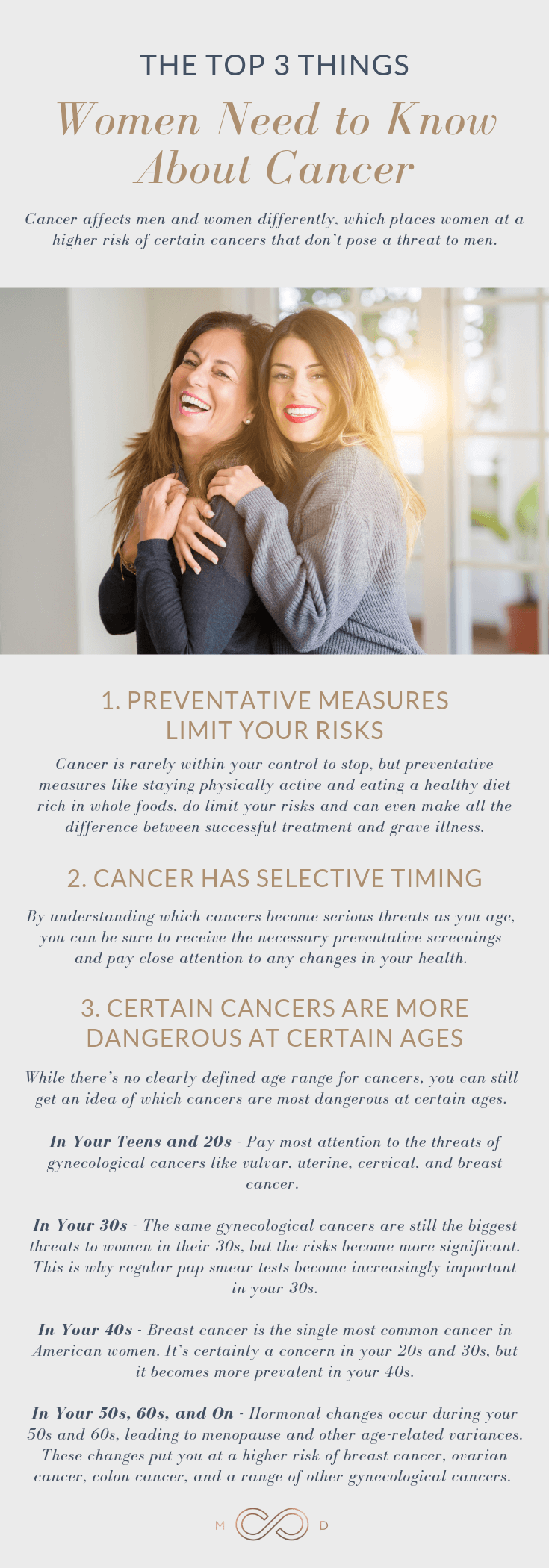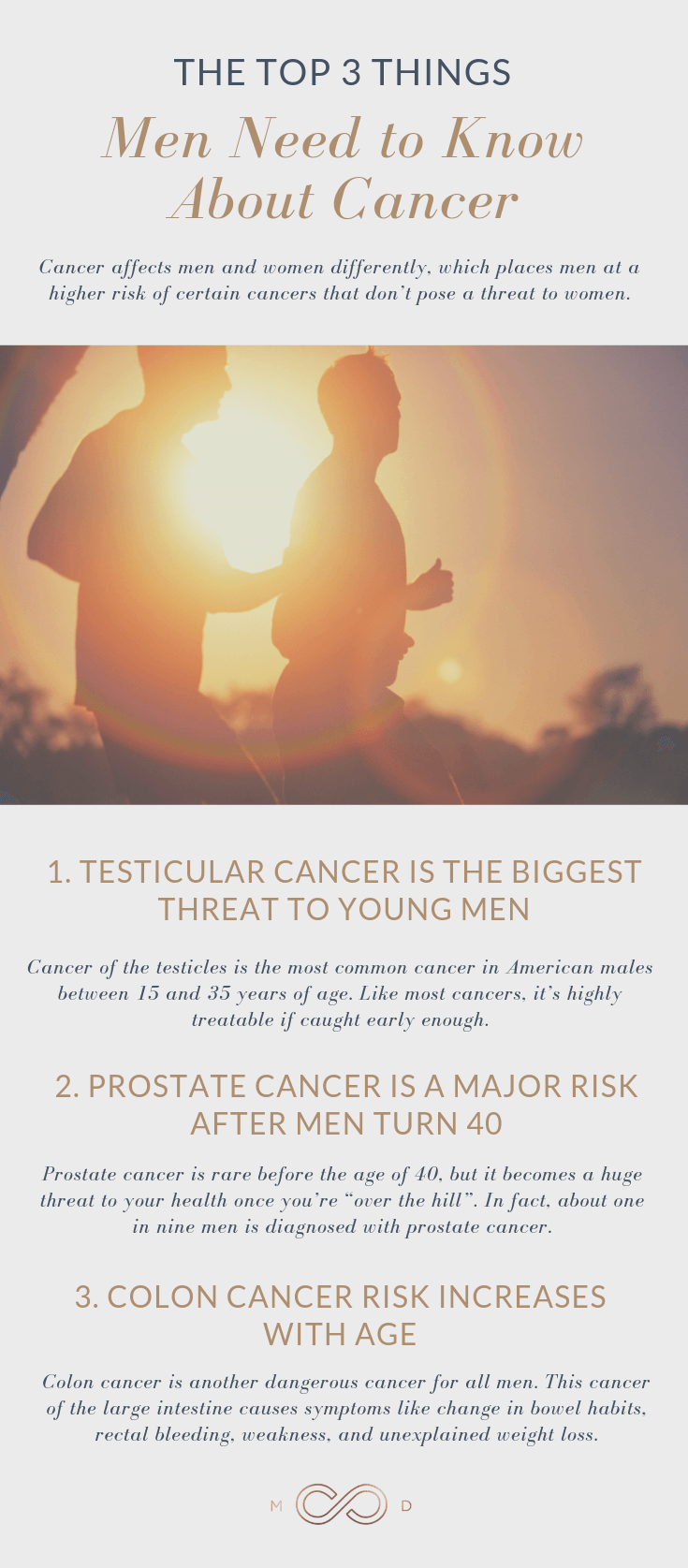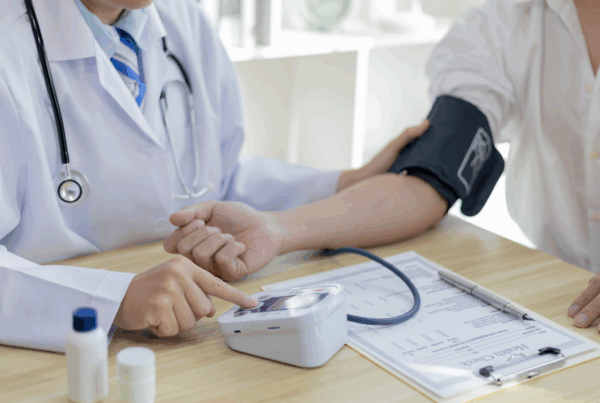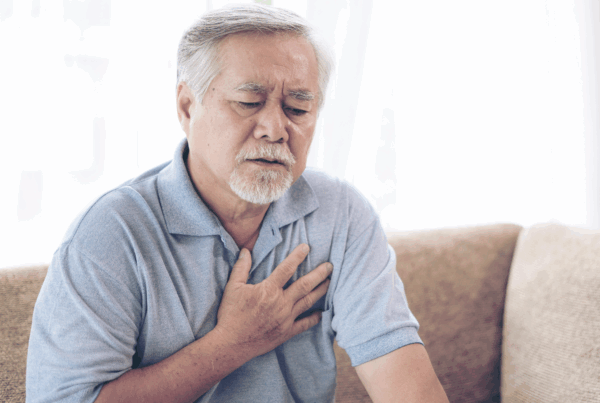We all know someone whose life has been permanently altered by cancer.
Cancer used to be the disease that happened to “other people.” We’d hear sad stories in the news and assume such a devastating condition could never touch our own family. But things have changed. Nearly two million new cases of cancer are diagnosed each year, with more than 600,000 people losing their battle with cancer annually.
Now we all know a friend, relative, colleague, or neighbor who has battled cancer. In fact, the majority of us have lost loved ones to breast cancer, lung cancer, prostate cancer, colon cancer, ovarian cancer, and other aggressive forms of this relentless disease.
The only good news is that we now have science and medicine on our side. We understand cancer better than ever before, which means we can screen for signs of cancer so early that timely treatment makes remission a reality for millions of men and women.
If your goal is to live an active, vibrant, rewarding life, it’s essential to learn more about the second most common cause of death in our country.
Why You Need To Educate Yourself About Cancer
Consider these statistics.
- 1,660 people die from cancer every single day.
- Three people learn they have cancer every minute of the day.
- Childhood cancer rates have increased 0.6% per year since 1975.
- Globally, breast cancer represents one in four of all cancers in women.
- One in 16 people in the US will be diagnosed with lung cancer in their lifetime.
- One in nine men will be diagnosed with prostate cancer during their lifetime.
These statistics matter to all of us! Not just ourselves, but also our children, siblings, parents, and friends. However, without educating yourself on cancer risks and prevention, you’ll never know how to best protect yourself and your loved ones from cancer’s sneaky tentacles.
Top 3 Things Women Need To Know About Cancer
Cancer affects men and women differently, which places women at a higher risk of certain cancers that don’t pose a threat to men. As a woman, make sure you understand the following three concepts regarding your body, your risks, and cancer.
Cancers Do Have Preventative Measures
Cancer is rarely within your control to stop, but preventative measures do limit your risks and can even make all the difference between successful treatment and grave illness.
Some preventative measures for women involve lifestyle choices:
- Eat a healthy diet rich in whole foods and low in sugar
- Don’t use tobacco
- Protect your skin and eyes from the sun
- Stay physically active
- Steer clear of risky behavior like unprotected sex and drug use
Other preventative measures include the medical care that keeps your body healthy and helps doctors identify any early signs of cancer:
- Practice self-exams at home, like feeling your breasts for lumps
- Receive all recommended preventative screenings from your doctor
- Get vaccinated, especially for Hepatitis B and HPV
Cancers Have Selective Timing
You might not feel concerned about ovarian cancer in your twenties, but it becomes a serious concern through menopause. The longer you live, the more at risk you become of developing cancer. By understanding which cancers become serious threats as you age, you can be sure to receive the necessary preventative screenings and pay close attention to any changes in your health.

An Age Guide to Cancer for Women
While there’s no clearly defined age range for cancers, you can still get an idea of which cancers are most dangerous in your 20s, 30s, 40s, and beyond. Remember — cancer doesn’t simply happen overnight. You don’t go to bed cancer-free and wake up with an untreatable form of cancer. It develops over time, so the earlier your diagnosis, the higher your chances of remission and recovery.
In Your Teens and 20s
Women in their late teens and 20s should pay most attention to the threats of gynecological cancers like vulvar, uterine, cervical, and breast cancer. Nearly one in 20 women is affected by a gynecological cancer, due largely to more than 100 different types of the Human Papillomavirus (HPV).
Pay close attention to your body and note any changes. Anything from abnormal vaginal bleeding and pain during intercourse to persistent itching could indicate the onset of a gynecological cancer. The sooner you seek medical attention, the better!
In Your 30s
The same gynecological cancers are still the biggest threats to women in their 30s, but the risks become more significant. This is why regular pap smear tests become increasingly important in your 30s. A pap smear tests the cells of the cervix for irregularities that could indicate cancer. If you have certain risk factors, your doctor may recommend a pap smear more frequently.
In Your 40s
Breast cancer is the single most common cancer in American women. It’s certainly a concern in your 20s and 30s, but it becomes more prevalent in your 40s. Since your breast tissue thins as you age and becomes easier to evaluate using mammograms, your 40th birthday and beyond is the best time to detect early onset of breast cancer. Considering that the average five-year survival rate of women with breast cancer located only in the breast is 99%, early detection and treatment can truly save your life!
In Your 50s, 60s, and On
Hormonal changes occur during your 50s and 60s, leading to menopause and other age-related variances. These changes put you at a higher risk of breast cancer, ovarian cancer, colon cancer, and a range of other gynecological cancers. Your regular screenings become more important than ever during this time.
One clear, healthy screening doesn’t mean you’re impervious to cancer for the rest of your life. Repeat your screenings every year to ensure cancer isn’t creeping into your body and putting your life at risk.
Top 3 Things Men Need To Know About Cancer
Men generally face a higher risk of cancer than women, especially in the forms of prostate, lung, colorectal, and bladder cancer.
Despite the different forms of cancer, the underlying rules of health remain the same: healthy habits and preventative measures can save your life.
Testicular Cancer Is the Biggest Threat to Young Men
Cancer of the testicles is the most common cancer in American males between 15 and 35 years of age. Like most cancers, it’s highly treatable if caught early enough.
Make sure you pay close attention for any of the following symptoms of testicular cancer:
- Lump or enlargement in either testicle
- A dull ache in the abdomen or groin area
- Unusual collection of fluid or pain in the scrotum
- Sudden back pain
- Undescended testicle
Though there’s no way to prevent testicular cancer, self-examinations and regular doctor’s visits make it possible to identify testicular cancer early and treat it into remission.

Prostate Cancer Is a Major Risk After Men Turn 40
Prostate cancer is rare before the age of 40, but it becomes a huge threat to your health once you’re “over the hill”. In fact, about one in nine men is diagnosed with prostate cancer. Unfortunately, it’s the second leading cause of death in American men, right behind lung cancer.
Prostate cancer develops when the prostate gland grows uncontrollably. It has the potential to be a serious and deadly disease, but it’s also highly treatable if caught early enough. Nearly three million men in the United States are currently living in remission from prostate cancer.
Colon Cancer Risk Increases With Age
Colon cancer is another dangerous cancer for all men. This cancer of the large intestine causes symptoms like change in bowel habits, rectal bleeding, weakness, and unexplained weight loss. It’s usually not a risk until after the age of 50, which is why colon cancer screenings begin at 50 and become increasingly important as you age.
About one in three people aren’t up to date with screening for colorectal cancer — make sure you’re not one of them, especially since 60% of deaths from colorectal cancer could be prevented with simple screenings!
The Bottom Line: Take Action While Time Is On Your Side
Cancer used to be a death sentence, but unprecedented medical and scientific advances have helped doctors treat cancer with higher success rates than ever before. In fact, there are 15.5 million cancer survivors living in our country right now.
New screening tests, earlier treatments, and more effective procedures have helped the overall cancer death rate decline since the early 1990s. Progress is happening before our eyes, but we still have a long way to go.
When cancers are caught early, they’re significantly more manageable and often even beatable! The biggest problems occur when diagnosis and treatment are delayed. Unfortunately, busy career-focused men and women are frequently tempted to ignore their symptoms and continue “pushing forward” for the sake of their job responsibilities.
If this sounds familiar, you could be placing yourself at incredible risk and rapidly losing the window of time when your cancer can be treated with the highest rate of success. Men are especially guilty of waiting until there’s a dramatic, undeniable problem to seek medical attention. Many face cancer diagnoses only to discover that it’s too late for effective treatment.
Don’t wait another minute to save your own life. Don’t ignore your symptoms for fear of the “Pandora’s Box” that a doctor’s appointment might reveal. Regular screening exams will help uncover signs of cancer early enough for you to receive the treatment you need to continue living an active and rewarding life.
It’s tempting to put your career before your health, but without your health, you can’t have a career at all. If you need help approaching your own cancer prevention and treatment, Brentwood MD is here to help you.
As a doctor of concierge medicine, I understand the extreme demands of your job and family life, which is exactly why I want to help you protect and improve your greatest asset — your health. I’m here to be your top health and wellness advocate.
Learn more about our concierge medicine practice now to start your journey to better health and wellness through cancer prevention, detection, and treatment.

Dr. Aaron Wenzel is a concierge physician specializing in the care of fast-moving entrepreneurs, executives, and public figures in the Nashville, TN area. Dr. Wenzel’s diverse life experience and extensive training in family medicine, emergency care, nutrition, and hormone replacement therapies give him the unique platform to provide unmatched care for his patients.






